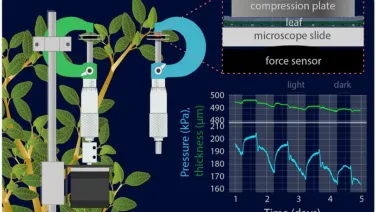News & events
News & events
Find out about our latest news and events.

Scientists from ANU and James Cook University have identified an "exquisite" natural mechanism that helps plants limit their water loss with little effect on carbon dioxide intake - an essential process for photosynthesis, plant growth and crop yield.

How do you tell if your plants need water? Recently, I asked this question of a group of about 40 biologists at the Australian National University.

Researchers have discovered why malaria parasites are vulnerable to some drug therapies but resistant to others, offering scientists another piece of the puzzle in the global fight against the disease.

Making good food choices is necessary both for ourselves and for the planet, says plant scientist Professor Justin Borevitz.

While Angus Rae focuses intently on a captivating microscopic world, he is actually working towards a solution for an environmental catastrophe occurring on a global scale.

A new research centre based at ANU will train the next generation of scientists to develop more resilient crops and significantly grow Australia's agricultural sector.

The root of Arabidopsis thaliana is an excellent model for studying cell differentiation in plants.
With the onset of climate change we have seen ongoing increases in mean global temperature, including a rise in night temperatures that has outpaced the rate of daytime warming.

I began my research career investigating the relationship between photosynthesis and nitrogen in the leaves of wheat, mainly out of curiosity.

RNA-binding proteins (RBPs) are critical regulators of gene expression, but have been poorly studied relative to other classes of gene regulators.

The emergence of widely virulent Puccinia graminis f. sp. tritici (Pgt) races over the past two decades has motivated global efforts to identify effective stem rust (Sr) resistance genes.

Plant resistance proteins act as immune receptors to recognise pathogen effectors and activate defense.